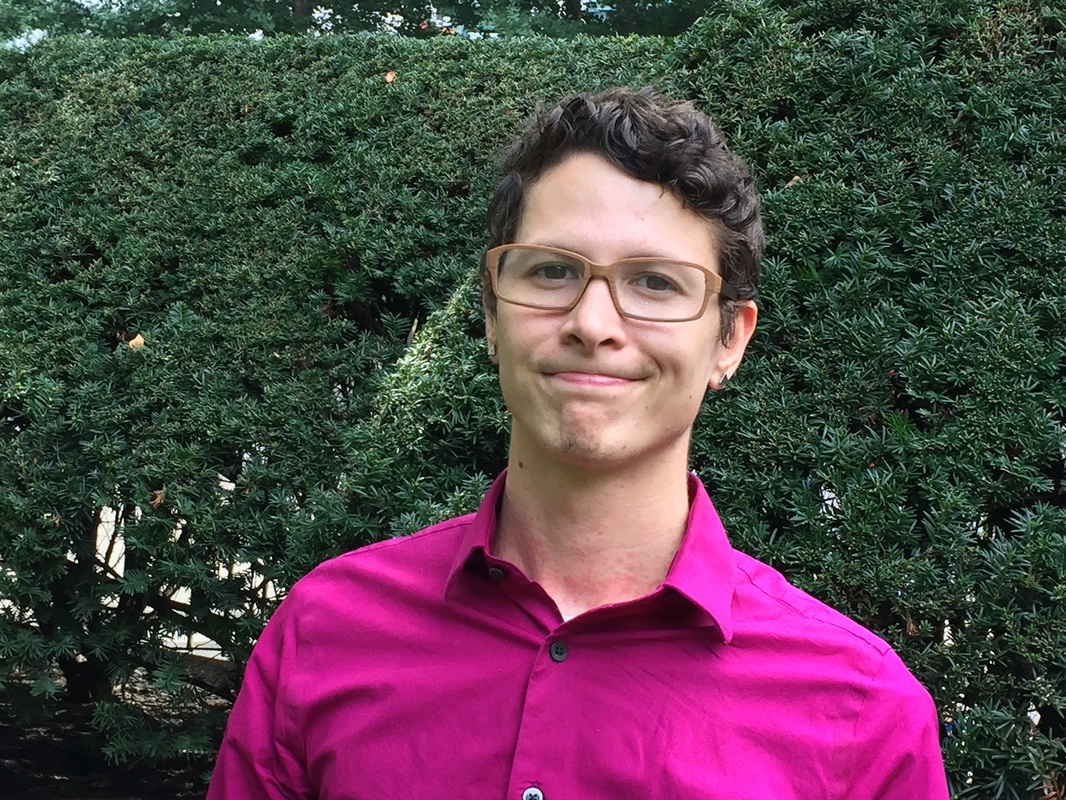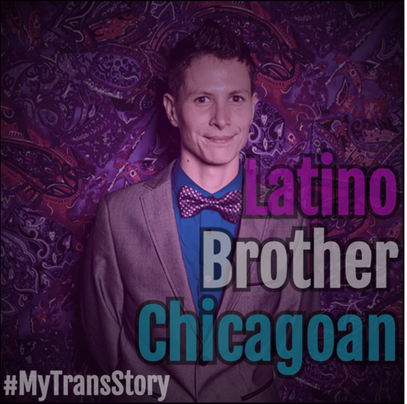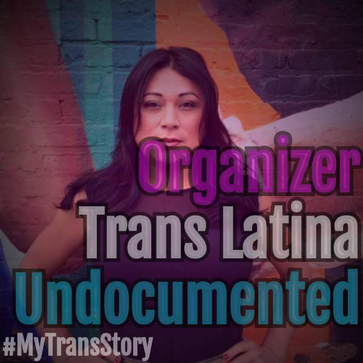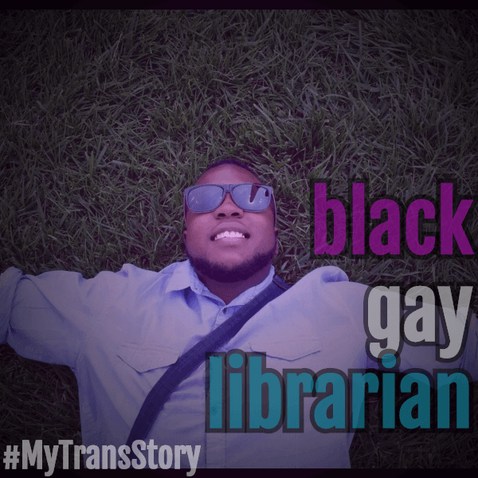|
Only days left to contribute to André Pérez' crowdfunding campaign
As Time magazine has declared, we are in an era of unprecedented attention to transgender issues in the mainstream culture. Just Sunday night at the Primetime Emmy Awards there were impassioned references to trans lives in victory speeches from Jill Solloway, creator of Transparent and Jeffrey Tambor, star of the Amazon drama.
While a fictionalized TV series with a trans lead character and a reality series about a transgender woman -- I Am Cait -- undoubtedly represent progress, there has been something largely missing from mainstream media depictions.
How do we create a more diverse representation... and show the incredible amount of diversity that is in the community?
Transparent and I Am Cait focus on the experience of white middle-class people in transition, which may give viewers a skewed perception of the trans experience.
André Pérez intends to address that.
Pérez, 27, is in the final days of a crowdfunding campaign for America in Transition, a documentary web series that will portray "social issues and stories of trans folks from overlooked communities."
At age 20 Pérez founded the Trans Oral History Project dedicated to recording the stories of transgender people. And he previously served as a facilitator on the Peabody Award-winning StoryCorps series, recording more than 500 interviews that led to 50 segments on NPR and WBEZ.
As the deadline neared on the America in Transition crowdfunding campaign, Nonfictionfilm.com spoke with Pérez about his ambitions for the series. Nonfictionfilm.com: Give us an overall sense of this project. André Pérez: America in Transition is a web series that focuses on trans people from underrepresented communities such as trans people of color and trans people from rural America. Each episode is going to focus on a different person in a different place, really trying to highlight the way that their immediate social context impacts their experience of being trans. Because to be trans in rural Kentucky and to be trans in San Francisco or to be trans in Burlington, Vermont are very different experiences.
André: In this moment where more people outside the transgender community are becoming aware of these issues that impact us, it's very important that they have a broader understanding of those issues than can be encapsulated in just a middle-class older white woman experience, which is what we're seeing through the Caitlyn Jenner show and through Becoming Us on ABC Family and through Transparent, right -- we're seeing people in similar situations, circumstances, but we're missing so many people's experiences... people who are Muslim and trans, people who are Mexican and trans, people who are Two Spirits, people who are in immigration detention facilities. There are so many issues that haven't been brought into the public consciousness and that's what America in Transition is about.
NFF: What's your fundraising goal? André: We're trying to raise $5,000 on an Indiegogo campaign that is going to go to shooting our first footage that we're going to compile into a trailer. NFF: How long do you envision each episode would be? André: The episodes are going to be short, like about 10 minutes long, so that way they can fit into a variety of formats such as workshops, discussions, classrooms.
NFF: Would each episode focus on a different person?
André: Yes, each episode focuses on a different person in a different place. NFF: Do you already have people in mind that you want to profile as part of the series? André: We definitely have people in mind that we've been talking to. We haven't confirmed everybody yet but one of the people I'm very excited about shooting is Ty Defoe. Ty is a Two Spirit person who does a lot of activism in the indigenous community. They're also an educator and multi-media artist. Ty is someone I'm excited about featuring because Native Americans are some of the most erased people in our society.
NFF: You come to this with a background in StoryCorps. How did that help you prepare for this project?
We can't rest on our laurels and say, "It's done." We haven't arrived. We are very much in process.
André: StoryCorps has been an incredibly inspiring organization to be a part of... What I hear people saying [about StoryCorps] is that they appreciate being able to connect with folks on a human level who might have very different experiences than they have and they really value the sense of, like, intimacy, of being able to connect with folks on a human level... That's a common tenet between America in Transition and StoryCorps.
When you go to the StoryCorps website there are hundreds of different types of stories from lots of different people. That's definitely a characteristic that we want in this work. We don't want it to be about just having some more celebrities, right. Because it's a two-edged sword for this moment of trans celebrity. On the one hand it's great to have a focus on our issues, if you will, and on the other hand does everybody need to be a celebrity? What about the value of an everyday person?
NFF: Where are we in this country on trans issues?
André: We're in a moment that has a tremendous amount of momentum and we can't forget that that comes from decades of people doing tons of work behind the scenes that went unnoticed. Things are changing really rapidly and that's exciting. People are paying attention to us because we're able to have conversations we weren't able to have even five years ago but at the same time we can't rest on our laurels and say, "It's done." We haven't arrived. We are very much in process. We need an entire shift in the social climate. It's not just about having a few token people on the cover of Time magazine or on an E! series. It's about how does that translate into making life different for everyday people -- so that everyday people have access to the health care they need, access to jobs, are taken seriously in their careers, are told that they have inherent worth as human beings and are not the victims of violence at the hands of strangers.
NFF: To what degree will your own story be part of the project?
André: I am definitely not the focus of the series itself. We have a behind-the-scenes access channel that is actually one of the perks of the Indiegogo campaign -- and it's only $20 so it's a pretty accessible perk. Part of that access channel is going to be sort of my own reflections as I go on this journey, travel and interview folks... So I'm not invisible but at the same time I want the episodes to really be an expression of something about the individual [being interviewed] more than it's about me necessarily. NFF: Tell me a little more about your background. André: I grew up in a Southern Baptist family in military towns in Virginia and so there were a lot of incredibly conservative influences in my childhood. In a lot of ways as I was growing up people didn't really know how to take me. People really assumed that I was gay from a young age and it wasn't really talked about except as an underlying tension in like school and in my family and just in life. I ended up going to college in Vermont, which is where I came out. I went to the north because I perceived it as a place that would be safer, and in a lot of ways it was. But I was in a very, very small town of like 50 and so I didn't know any trans people and that's really what led me to found the Trans Oral History Project because I was seeking elders and support. I really had so many questions about how the decision to transition would impact my life and my ability to find a job or really just any kind of future opportunities. So I sought out trans elders to talk to and I found it really comforting realizing there were people doing this activist work for decades before me. It was grounding and so I wanted to share that experience with other people.
|
AuthorMatthew Carey is a documentary filmmaker and journalist. His work has appeared on Deadline.com, CNN, CNN.com, TheWrap.com, NBCNews.com and in Documentary magazine. |
- Home
- News
- Videos
-
Galleries
- 2019 Tribeca Film Festival
- Full Frame Documentary Film Festival
- 2019 SXSW Film Festival
- SXSW 2018 Gallery
- 2019 Sundance Film Festival
- Outfest 2018 Photo Gallery
- Outfest 2017
- Sundance 2018 Photos
- 2017 LA Film Festival
- 2017 Cannes Film Festival
- Tribeca Film Festival 2017
- SXSW 2017 Gallery
- 2017 Berlin Film Festival
- Sundance 2017 Gallery
- 2016 Los Angeles Film Festival
- Cannes Film Festival 2016
- SXSW 2016 Gallery
- Berlinale 2016 Gallery
- Sundance 2016 Gallery
- Filmmaker Gallery
- About
- Contact
Proudly powered by Weebly
- Home
- News
- Videos
-
Galleries
- 2019 Tribeca Film Festival
- Full Frame Documentary Film Festival
- 2019 SXSW Film Festival
- SXSW 2018 Gallery
- 2019 Sundance Film Festival
- Outfest 2018 Photo Gallery
- Outfest 2017
- Sundance 2018 Photos
- 2017 LA Film Festival
- 2017 Cannes Film Festival
- Tribeca Film Festival 2017
- SXSW 2017 Gallery
- 2017 Berlin Film Festival
- Sundance 2017 Gallery
- 2016 Los Angeles Film Festival
- Cannes Film Festival 2016
- SXSW 2016 Gallery
- Berlinale 2016 Gallery
- Sundance 2016 Gallery
- Filmmaker Gallery
- About
- Contact





 RSS Feed
RSS Feed